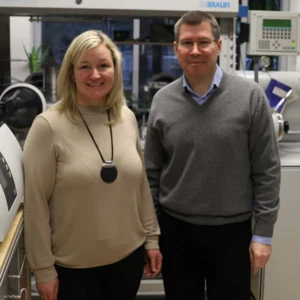
08.04.2024 by Aileen Sammler
Thermal Analysis at the Max-Planck Institute for Chemical Physics of Solids
The Max Planck Society is the responsible body for a large number of basic research facilities in Germany and abroad. With its 84 institutes and facilities, it is Germany’s most successful research organization and the international flagship for German science.
The Max-Planck-Institut für Chemische Physik fester Stoffe (Chemical Physics of Solids) in Dresden uses NETZSCH thermal analysis instruments to support the synthesis and crystal growing at the institute. In particular, the NETZSCH Skimmer coupling makes it possible to identify easily condensable gases such as arsenic, tellurium or various metal vapors, even at high temperatures.
This is a case study by Susann Scharsach and Dr. Marcus Schmidt about Thermal Analysis Systems Supporting the Synthesis and Crystal Growing at the Max Planck Institute.

„NETZSCH thermal analysis instruments support the synthesis and crystal growing at the institute. In particular, the Skimmer coupling makes it possible to identify easily condensable gases such as arsenic, tellurium or various metal vapors, even at high temperatures.“
NETZSCH Analyzing & Testing's Role in Customer Successes
Get to know the diverse applications of our instruments, from thermal analysis and rheology to fire testing.
Witness firsthand the satisfaction of our customers and understand why NETZSCH Analyzing & Testing remains a trusted, reliable partner for its customers, driving them towards excellence.
What challenges did these companies face before choosing NETZSCH? What issues were they dealing to address with our solutions? And how have our instruments helped them tackle their specific challenges in research, quality control, development or production?
Find our more at our new website section:
